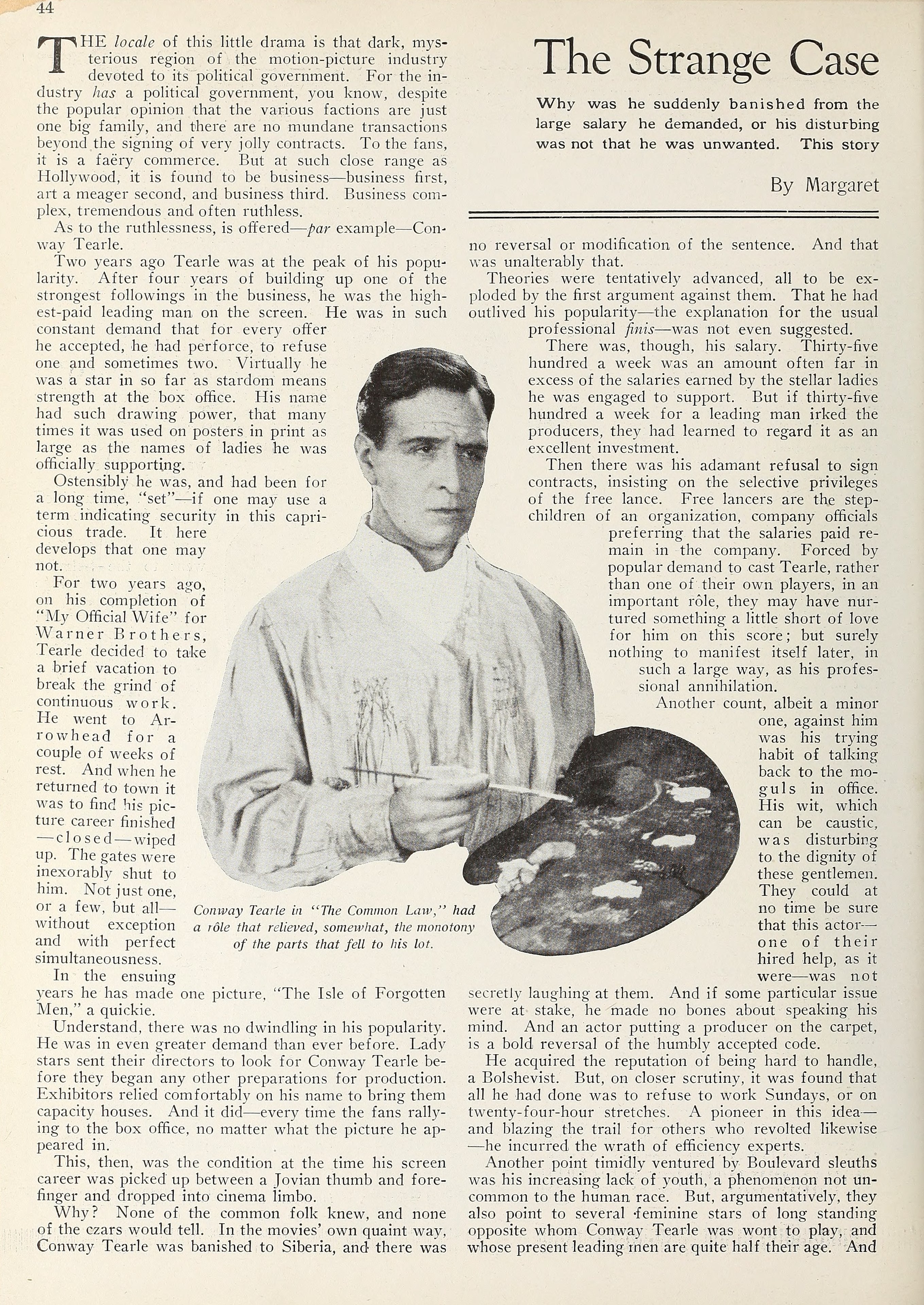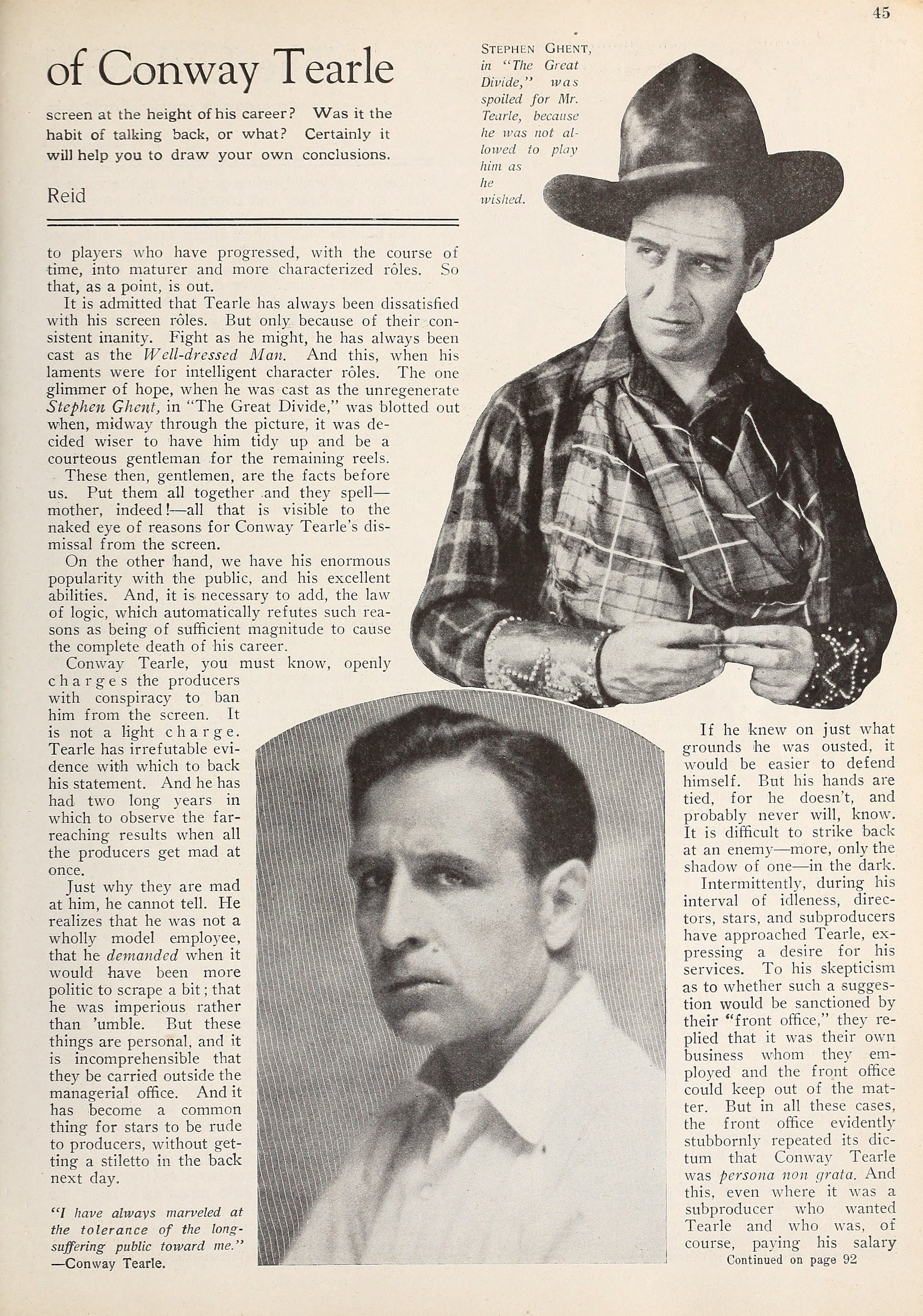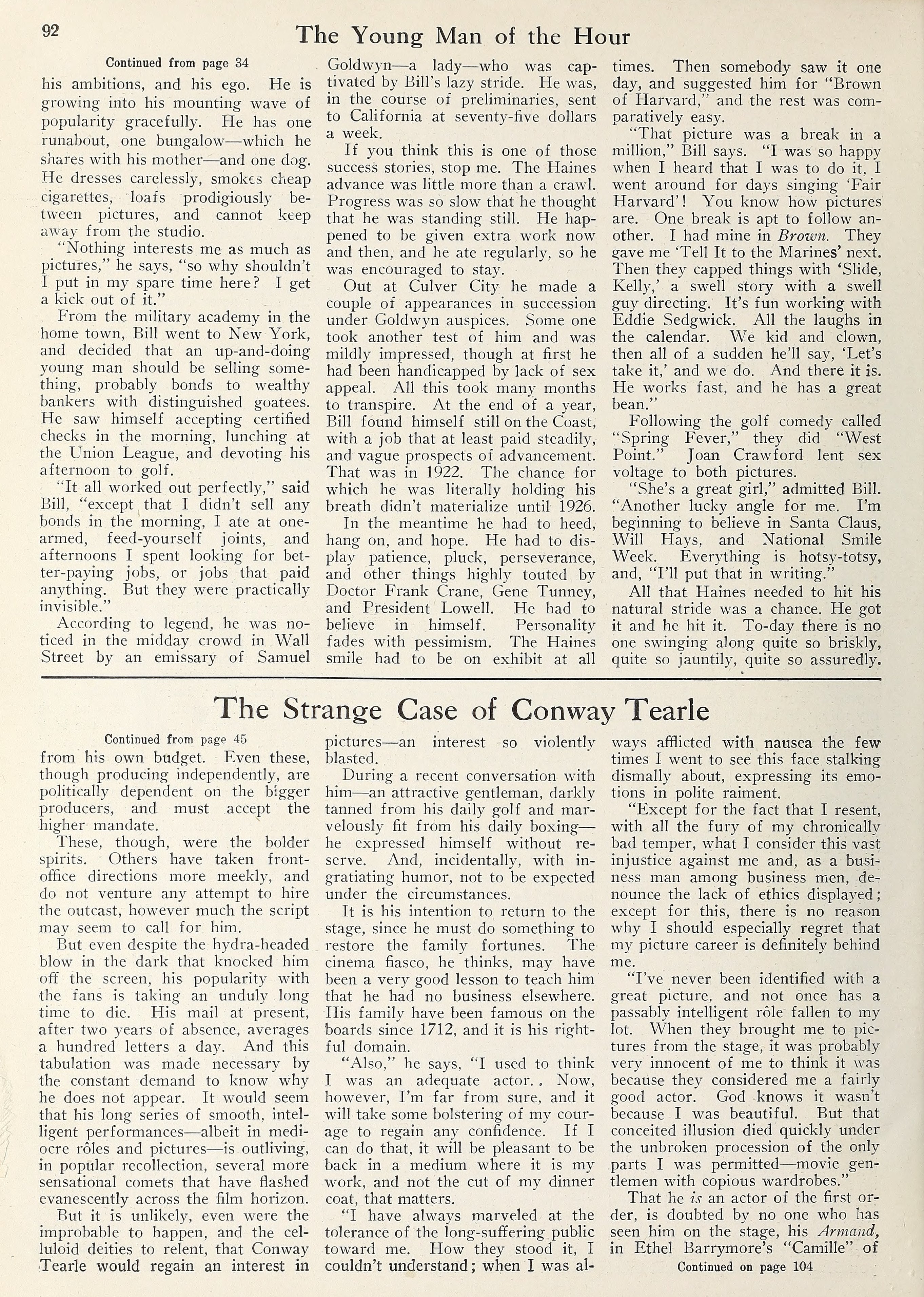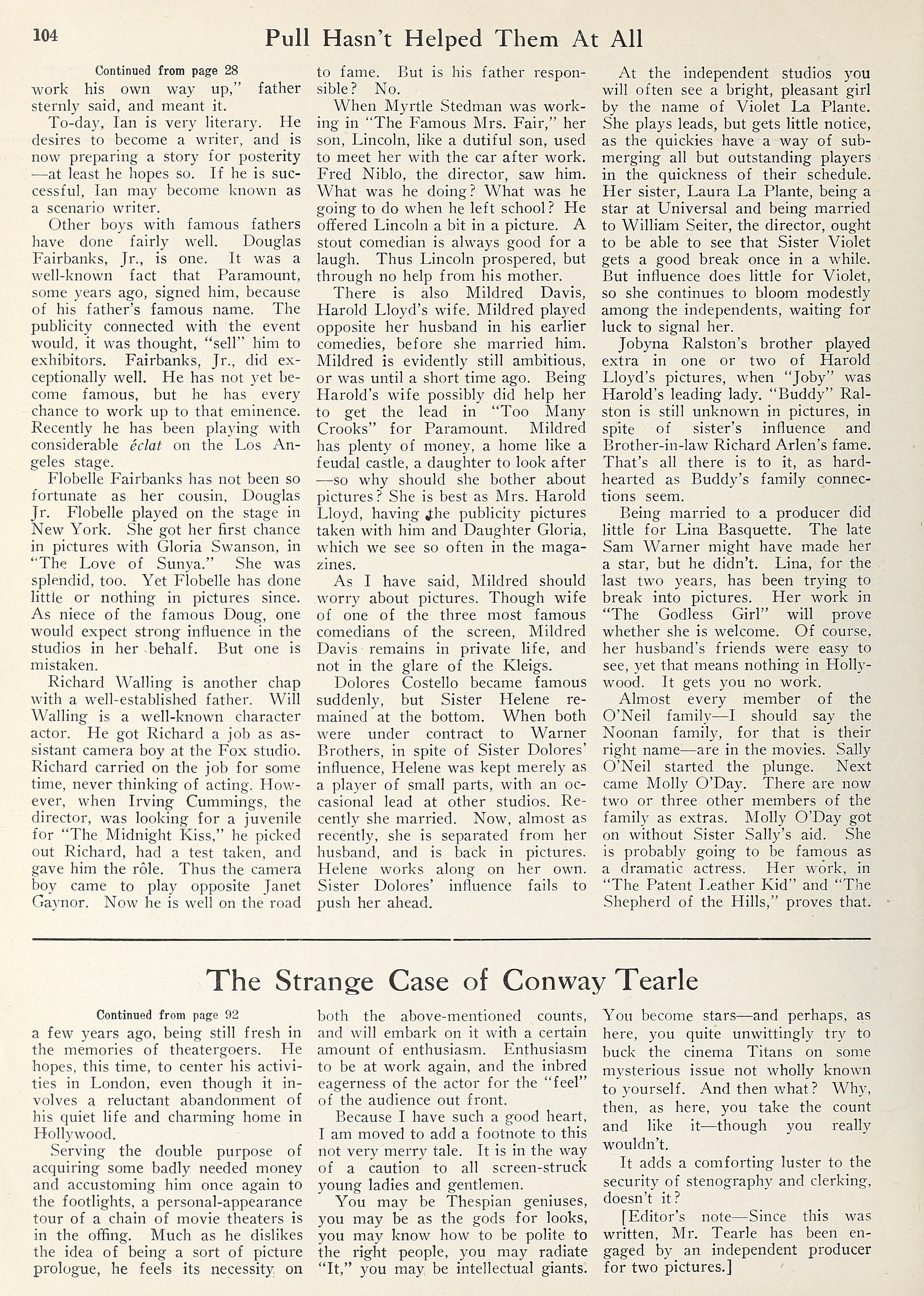The Strange Case of Conway Tearle (1928) 🇺🇸

The locale of this little drama is that dark, mysterious region of the motion-picture industry devoted to its political government. For the industry has a political government, you know, despite the popular opinion that the various factions are just one big family, and there are no mundane transactions beyond the signing of very jolly contracts. To the fans, it is a faëry commerce. But at such close range as Hollywood, it is found to be business — business first, art a meager second, and business third. Business complex, tremendous and often ruthless.
by Margaret Reid
As to the ruthlessness, is offered — par example — Conway Tearle.
Two years ago Tearle was at the peak of his popularity. After four years of building up one of the strongest followings in the business, he was the highest-paid leading man on the screen. He was in such constant demand that for every offer he accepted, he had perforce, to refuse one and sometimes two. Virtually he was a star in so far as stardom means strength at the box office. His name had such drawing power, that many times it was used on posters in print as large as the names of ladies he was officially supporting.
Ostensibly he was, and had been for a long time, “set” — if one may use a term indicating security in this capricious trade. It here develops that one may not.
For two years ago, on his completion of “My Official Wife” for Warner Brothers, Tearle decided to take a brief vacation to break the grind of continuous work. He went to Arrowhead for a couple of weeks of rest. And when he returned to town it was to find his picture career finished — closed — wiped up. The gates were inexorably shut to him. Not just one, or a few, but all — without exception and with perfect simultaneousness.
In the ensuing years he has made one picture, “The Isle of Forgotten Men,” a quickie.
Understand, there was no dwindling in his popularity. He was in even greater demand than ever before. Lady stars sent their directors to look for Conway Tearle before they began any other preparations for production. Exhibitors relied comfortably on his name to bring them capacity houses. And it did — every time the fans rallying to the box office, no matter what the picture he appeared in.
This, then, was the condition at the time his screen career was picked up between a Jovian thumb and forefinger and dropped into cinema limbo.
Why? None of the common folk knew, and none of the czars would tell. In the movies’ own quaint way, Conway Tearle was banished to Siberia, and there was no reversal or modification of the sentence. And that was unalterably that.
Theories were tentatively advanced, all to be exploded by the first argument against them. That he had outlived his popularity — the explanation for the usual professional finis — was not even suggested.
There was, though, his salary. Thirty-five hundred a week was an amount often far in excess of the salaries earned by the stellar ladies he was engaged to support. But if thirty-five hundred a week for a leading man irked the producers, they had learned to regard it as an excellent investment.
Then there was his adamant refusal to sign contracts, insisting on the selective privileges of the free lance. Free lancers are the step-children of an organization, company officials preferring that the salaries paid remain in the company. Forced by popular demand to cast Tearle, rather than one of their own players, in an important role, they may have nurtured something a little short of love for him on this score; but surely nothing to manifest itself later, in such a large way, as his professional annihilation.
Another count, albeit a minor one, against him was his trying habit of talking back to the mogul s in office. His wit, which can be caustic, was disturbing to the dignity of these gentlemen. They could at no time be sure that this actor — one of their hired help, as it were — was not secretly laughing at them. And if some particular issue were at stake, he made no bones about speaking his mind. And an actor putting a producer on the carpet, is a bold reversal of the humbly accepted code.
He acquired the reputation of being hard to handle, a Bolshevist. But, on closer scrutiny, it was found that all he had done was to refuse to work Sundays, or on twenty-four-hour stretches. A pioneer in this idea — and blazing the trail for others who revolted likewise — he incurred the wrath of efficiency experts.
Another point timidly ventured by Boulevard sleuths was his increasing lack of youth, a phenomenon not uncommon to the human race. But, argumentatively, they also point to several feminine stars of long standing opposite whom Conway Tearle was wont to play, and whose present leading men are quite half their age. And to players who have progressed, with the course of time, into maturer and more characterized roles. So that, as a point, is out.
It is admitted that Tearle has always been dissatisfied with his screen roles. But only because of their consistent inanity. Fight as he might, he has always been cast as the Well-dressed Man. And this, when his laments were for intelligent character roles. The one glimmer of hope, when he was cast as the unregenerate Stephen Ghent, in “The Great Divide,” was blotted out when, midway through the picture, it was decided wiser to have him tidy up and be a courteous gentleman for the remaining reels.
These then, gentlemen, are the facts before us. Put them all together and they spell — mother, indeed! — all that is visible to the naked eye of reasons for Conway Tearle’s dismissal from the screen.
On the other hand, we have his enormous popularity with the public, and his excellent abilities. And, it is necessary to add, the law of logic, which automatically refutes such reasons as being of sufficient magnitude to cause the complete death of his career.
Conway Tearle, you must know, openly charges the producers with conspiracy to ban him from the screen. It is not a light charge. Tearle has irrefutable evidence with which to back his statement. And he has had two long years in which to observe the far-reaching results when all the producers get mad at once.
Just why they are mad at him, he cannot tell. He realizes that he was not a wholly model employee, that he demanded when it would have been more politic to scrape a bit; that he was imperious rather than humble. But these things are personal, and it is incomprehensible that they be carried outside the managerial office. And it has become a common thing for stars to be rude to producers, without getting a stiletto in the back next day.
If he knew on just what grounds he was ousted, it would be easier to defend himself. But his hands are tied, for he doesn’t, and probably never will, know. It is difficult to strike back at an enemy — more, only the shadow of one — in the dark.
Intermittently, during his interval of idleness, directors, stars, and sub-producers have approached Tearle, expressing a desire for his services. To his skepticism as to whether such a suggestion would be sanctioned by their “front office,” they replied that it was their own business whom they employed and the front office could keep out of the matter. But in all these cases, the front office evidently stubbornly repeated its dictum that Conway Tearle was persona non grata. And this, even where it was a sub-producer who wanted Tearle and who was, of course, paying his salary a few years ago, being still fresh in the memories of theatergoers. He hopes, this time, to center his activities in London, even though it involves a reluctant abandonment of his quiet life and charming home in Hollywood.
Serving the double purpose of acquiring some badly needed money and accustoming him once again to the footlights, a personal-appearance tour of a chain of movie theaters is in the offing. Much as he dislikes the idea of being a sort of picture prologue, he feels its necessity on
both the above-mentioned counts, and will embark on it with a certain amount of enthusiasm. Enthusiasm to be at work again, and the inbred eagerness of the actor for the “feel” of the audience out front.
Because I have such a good heart, I am moved to add a footnote to this not very merry tale. It is in the way of a caution to all screen-struck young ladies and gentlemen.
You may be Thespian geniuses, you may be as the gods for looks, you may know how to be polite to the right people, you may radiate “It,” you may be intellectual giants.
You become stars — and perhaps, as here, you quite unwittingly try to buck the cinema Titans on some mysterious issue not wholly known to yourself. And then what? Why, then, as here, you take the count and like it — though you really wouldn’t.
It adds a comforting luster to the security of stenography and clerking, doesn’t it?
[Editor’s note — Since this was written, Mr. Tearle has been engaged by an independent producer for two pictures.]

Conway Tearle in “The Common Law,” had a role that relieved, somewhat, the monotony of the parts that fell to his lot.

Stephen Ghent, in “The Great Divide,” was spoiled for Mr. Tearle, because he was not allowed to play him as he wished.
“I have always marveled at the tolerance of the long-suffering public toward me.” — Conway Tearle.


Collection: Picture Play Magazine, August 1928
